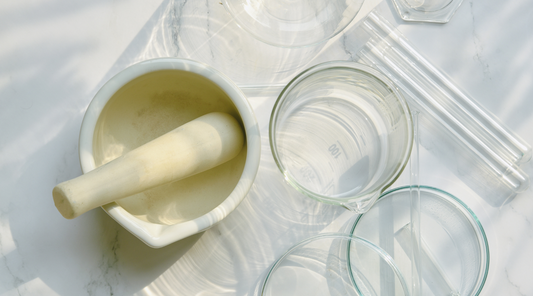Sensitive, Reactive, Easily Irritated? Your Skin Barrier Might Be to Blame
Share
Sensitive skin isn’t just about genetics or skin type—it’s often a sign that your skin barrier is compromised. When functioning properly, your barrier acts like a protective shield, locking in moisture and keeping irritants out. But when that shield breaks down? Redness, stinging, dryness, and inflammation follow. The good news? You can support and rebuild it with the right approach and ingredients.
What is the Skin Barrier, Really?
Think of your skin barrier as your body’s frontline defense. This outermost layer, known as the stratum corneum, is composed of skin cells held together by a matrix of lipids—including ceramides, fatty acids, and cholesterol. Together, they maintain hydration, prevent irritant penetration, and support skin resilience[5].
When the Barrier Breaks: What Causes Sensitivity
A compromised barrier doesn’t just lead to dry, flaky skin, it also increases your skin’s reactivity. Common triggers for barrier damage include:
- Over-exfoliation (physical or chemical)
- Harsh cleansers and stripping surfactants
- UV exposure and pollution
- Seasonal or climate shifts
- Inflammatory skin conditions like eczema or rosacea
Supportive Ingredients for Sensitive, Barrier-Compromised Skin
Barrier care isn’t just about avoiding the wrong ingredients; it’s about choosing the right ones. Here are clinically supported ingredients known to repair, protect, and soothe sensitive skin:
Barrier Rebuilders
These ingredients help restore the skin’s natural structure by replenishing the lipids and compounds that hold your barrier together.
· Niacinamide (Vitamin B3): supports barrier function by increasing the production of ceramides and other intercellular lipids. This helps reduce water loss and boosts the skin’s ability to defend against irritants. It also has anti-inflammatory effects that make it ideal for calming sensitive skin[1].
· Ceramides: essential components of the skin’s lipid matrix. When applied topically, they help replenish what your skin naturally loses due to age or damage, restoring barrier strength, improving moisture retention, and soothing irritation[4].
· Fatty Acids: essential fatty acids (like linoleic acid) are critical for keeping the skin barrier intact. They help restore the lipid balance, reinforce structural integrity, and reduce flakiness and inflammation, particularly in dry or damaged skin[5].
· N-Acetyl Glucosamine (NAG): a building block of hyaluronic acid and plays a supportive role in strengthening the skin barrier by improving hydration and promoting healthy exfoliation. It enhances skin smoothness without the irritation commonly caused by stronger actives[3].
Hydration and Moisture Support
Moisture is vital to barrier repair. These ingredients help draw in and hold onto water to keep skin plump, smooth, and resilient.
· Panthenol (Provitamin B5): a deeply hydrating humectant that attracts moisture to the skin and supports barrier repair by improving lipid synthesis. It’s also known for its wound-healing and anti-inflammatory benefits, making it a go-to for sensitive skin types[2].
· Gluconolactone (PHA): unlike stronger exfoliants, gluconolactone gently removes dead skin cells without disrupting the skin barrier. It also functions as a humectant, enhancing hydration, and as an antioxidant, protecting skin from environmental stressors—all while being well tolerated by reactive skin[8].
Soothing Antioxidants
Sensitive skin often shows signs of inflammation and stress. These botanicals provide antioxidant protection and help calm visible redness and discomfort.
· Cucumber Extract: naturally rich in antioxidants and vitamin C, cucumber extract delivers a cooling, soothing effect on contact. It helps reduce puffiness and inflammation while gently hydrating the skin[6].
· Watermelon Extract: this antioxidant-rich fruit extract provides hydration and helps protect skin from oxidative damage. Its amino acid content supports moisture balance, while its soothing properties offer relief for stressed or sensitive skin[7].
· Green Tea Extract: packed with polyphenols (particularly EGCG), green tea extract helps neutralize free radicals while reducing inflammation and redness. It’s especially beneficial for sensitive, acne-prone, or reactive skin, as it helps calm flare-ups and supports long-term skin health[9].
Skin Barrier Myths, Debunked
Let’s clear up a few misconceptions that might be sabotaging your sensitive skin routine:
❌ Myth: “If your skin is dry, you need to exfoliate to reveal fresh skin underneath.”
Truth: Dryness isn’t always about buildup; it’s often a sign that your skin barrier is compromised. In that case, exfoliating can make things worse. Instead, focus on restoring hydration and reinforcing your barrier with ceramides, fatty acids, and gentle humectants.
❌ Myth: “If it stings, it’s working.”
Truth: Stinging is a sign of irritation, not efficacy. A healthy product shouldn’t cause discomfort, especially on already sensitive or compromised skin.
❌ Myth: “Thicker creams always mean better barrier protection.”
Truth: It's not about how rich a formula feels, it’s about what’s inside. Look for formulas that include barrier-repairing ingredients like niacinamide, ceramides, and panthenol—not just heavy occlusives.
How to Care for Sensitive Skin
Caring for sensitive skin is about building up, not stripping down. Here’s your game plan:
- Simplify your routine: fewer, better-formulated products.
- Moisturize regularly, especially with ceramide-rich formulas.
- Avoid fragrances, drying alcohols, and essential oils.
- Use SPF daily—UV damage weakens your barrier over time.
- Hydrate inside and out—skin health is systemic.
Final Thoughts: Barrier Support is Skin Support
Sensitive skin isn’t a flaw—it’s your skin asking for care. At Bēm, we don’t believe in overcorrecting or overcomplicating, we believe in restoring balance. That’s why our formulas center on barrier-strengthening ingredients like niacinamide, N-acetyl glucosamine, panthenol, and botanical hydrators that support your skin without overwhelming it.
Disclaimer
This post is for informational and educational purposes only. It’s not meant to treat, diagnose, or offer medical advice. Everyone's skin is unique, so we always recommend talking to a trusted dermatologist or healthcare provider before starting a new skincare routine—especially if you have specific skin concerns. All ingredient insights shared are based on publicly available research and clinical studies, which are cited.
References
[1] https://pubmed.ncbi.nlm.nih.gov/10971324/ [2] https://pmc.ncbi.nlm.nih.gov/articles/PMC7949647/ [3] https://pubmed.ncbi.nlm.nih.gov/19691938/ [4] https://onlinelibrary.wiley.com/doi/10.1111/ics.12972 [5] https://pmc.ncbi.nlm.nih.gov/articles/PMC10841493/ [6] https://www.researchgate.net/publication/260228305 [7] https://www.researchgate.net/publication/366002146 [8] https://pubmed.ncbi.nlm.nih.gov/15002657/ [9] https://onlinelibrary.wiley.com/doi/10.1155/2012/560682

